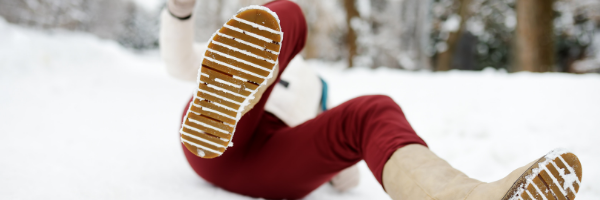Minnesota Winter Slip and Fall Injury Claims
In Minnesota, a slip and fall accident caused by poor or improper maintenance is one of the most common forms of premises liability claims. Landlords and property owners have a duty to keep their properties reasonably safe for visitors and tenants. When they fail to do so and someone is injured because of their negligence, they can be held liable for damages.
What Causes Slip and Fall Injuries in the Winter?
Minnesota winters bring ice, snow, and slush — all of which create dangerous walking conditions. People often slip in parking lots, apartment complexes, or common areas that have not been properly maintained. Inside retail stores or restaurants, melted snow and water can create slick floors that lead to serious injuries, including traumatic brain injuries (TBIs) and broken bones. Property owners are required to take reasonable steps to prevent these hazards, such as timely snow removal, salting, and cleaning wet entryways.
Common Minnesota Slip and Fall Injuries
Traumatic Brain Injuries (TBIs)
When someone slips and hits their head on the ground or a nearby object, it can result in a traumatic brain injury. TBIs can cause lifelong complications, including physical, emotional, and cognitive impairment. Immediate medical attention is crucial—brain injuries can worsen if untreated.
Broken or Fractured Bones
Fractures and broken bones are among the most frequent outcomes of winter slip and fall accidents. They are especially common on icy sidewalks, driveways, and stairs, where even a minor fall can lead to significant injury and lengthy recovery times.
Back and Spinal Cord Injuries
Many victims land hard on their backs, leading to spinal cord injuries, soft tissue damage, herniated disks, or spinal dislocation. These injuries can cause long-term pain, numbness, nerve damage, or even paralysis.
Who Is Liable for a Slip and Fall Injury?
Liability depends on where and how the fall occurred. For example:
- Inside a store or restaurant: The business owner is typically responsible for maintaining safe conditions and may be held liable if they fail to do so.
- In common areas of multi-tenant properties: The property owner or landlord is generally responsible for maintaining shared spaces like sidewalks, parking lots, or entryways.
- When a maintenance contractor is hired: If a landlord contracts a snow or ice removal company and that company fails to perform, the contractor may bear responsibility for the injury.
Common Defenses in Slip and Fall Cases
Minnesota juries—and insurance companies—are often skeptical of winter slip and fall claims because icy conditions are considered part of everyday life here. Common defenses insurers use include:
- Reasonable time to clear snow or ice: Property owners are generally given up to 24 hours after a snowfall to clean up hazards.
- Inappropriate footwear: Insurers may argue that wearing dress shoes or heels instead of boots or rubber-soled shoes contributed to the fall.
- Familiarity with the area: If you frequently visit or live at the property, the defense may argue you should have been aware of the hazard.
- “Open and obvious” hazards: If the patch of ice or snow was visible and you failed to avoid it, insurers often claim you were responsible for your own fall.
How to Strengthen Your Slip and Fall Claim
Be proactive and document everything. When speaking with the insurance company, be prepared for their defenses. Here’s what to do:
- Take clear photos of the scene showing the unsafe condition (ice, snow, water, lack of maintenance).
- Photograph your shoes—top and bottom—to show proper tread.
- Explain why you took the path you did. If it was the only safe route available, note that clearly.
- Describe how careful you were and how the hazard was unavoidable.
If you tell an insurance adjuster that you don’t know what caused your fall, your claim will likely be denied—so gather as much evidence as possible immediately after the incident.
Contact Us
Slip and fall claims are very fact-specific, so hiring an attorney quickly can make all the difference. A lawyer can visit the accident site, document conditions, and preserve critical evidence before it’s gone. If you’ve been injured in a slip and fall accident, call or text 612-Injured at (612) 465-8733 to speak with an experienced Minnesota slip and fall lawyer. Your consultation is free, and you pay nothing unless we win your case.

